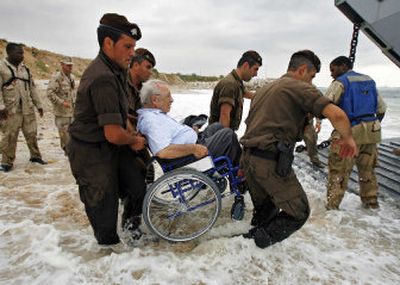Israel aiming to make buffer zone in Lebanon

BEIRUT, Lebanon – Pitched battles raged between Israeli forces and Hezbollah fighters on the border Thursday, and Israel warned hundreds of thousands of people to flee southern Lebanon “immediately,” preparing for a likely ground offensive to set up a buffer zone.
U.N. chief Kofi Annan warned of a humanitarian crisis in Lebanon and called for an immediate cease-fire, even as he admitted “serious obstacles” stand in the way of even easing the violence. Annan denounced Israel for “excessive use of force” and Hezbollah for holding “an entire nation hostage” with its rocket attacks and snatching of two Israeli soldiers last week.
As the death toll rose to 330 in Lebanon, and reached 32 in Israel, Lebanese streamed north into the capital and other regions, crowding into schools, relatives’ homes or hotels.
Taxi drivers in the south were charging up to $400 per person for rides to Beirut – more than 40 times the usual price. In remote villages of the south, cut off by strikes, residents made their way out over the mountains by foot.
The price of food, medical supplies and gasoline rose by as much as 500 percent in parts of Lebanon on Thursday as Israel’s relentless bombardment destroyed roads, bridges and other supply routes. The World Food Program said estimates of basic food supplies ranged from one to three months.
On a day that saw U.S. Marines return to Lebanon for the first time in 22 years, the war looked ready to expand dramatically. Neither side showed any sign of backing down. Hezbollah refused to release its two Israeli soldiers without a prisoner exchange. Israel was aiming to create a new buffer zone in a region that saw 18 years of Israeli presence ending in 2000.
Hezbollah leader Sheik Hassan Nasrallah shrugged off concerns of a stepped-up Israeli onslaught, vowing never to release two Israeli soldiers captured by his guerrillas even “if the whole universe comes (against us).” He said they would be freed only as part of a prisoner exchange brokered through indirect negotiations.
He spoke in an interview with the Al-Jazeera news network taped Thursday to show he had survived a heavy airstrike in south Beirut that Israel said targeted a Hezbollah underground leadership bunker. The guerrillas said the strike only hit a mosque under construction and no one was hurt.
The United States – which has resisted calls to press its ally Israel to halt the fighting – was sending Secretary of State Condoleezza Rice to the region, arriving in Israel on Tuesday or Wednesday after stopping over in Arab nations, Israeli officials said. They spoke on condition of anonymity because the schedule was not yet confirmed.
The mission would be the first U.S. diplomatic effort on the ground since the Israeli onslaught against Lebanon began nine days ago.
McClatchy Newspapers reported that a coalition of U.S. lawmakers will head to Israel this weekend, House Speaker Dennis Hastert said in a statement late Thursday. Reps. Peter Hoekstra, R-Mich.; Jane Harman, D-Calif.; Rick Renzi, R-Ariz.; and Darrell Issa, R-Calif., all members of the House Intelligence Committee, will meet with American, Israeli and Palestinian officials to discuss efforts to end the fighting.
Israel has decided air power alone will not be enough to drive Hezbollah back from the Israel-Lebanon border and that a ground force will be needed to establish a zone that is at least 20 miles deep, senior military officials said Thursday.
The U.N. estimated that about a half-million people have been displaced in Lebanon, with 130,000 fleeing to Syria and about 45,000 believed to be in need of assistance.
The exodus of Americans and other foreign nationals stepped up dramatically, with ships lining up off Beirut to take thousands of families waiting at the port out of the war zone.
A group of around 40 U.S. Marines hit the ground in Beirut, helping in the evacuation of hundreds of Americans to a Navy transport vessel, the USS Nashville, offshore – the first U.S. military deployment in Lebanon in 22 years. More than 2,200 Americans were pulled out Thursday, twice the number of a day before.
Israeli forces resumed attacks on Beirut at daybreak on Friday, witnesses said. One loud explosion was heard in the Lebanese capital.
Al-Arabiya TV said the strike had targeted Beirut’s southern suburbs, Hezbollah’s stronghold. Israeli strikes Thursday pounded southern Beirut and villages and towns in the Shiite heartland of the south and the eastern Bekaa Valley.
Hezbollah, in turn, fired more than 40 rockets into northern Israel.